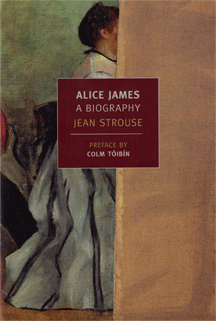By Lewis Fried
Alice James is remembered for two things. First, she was a member of an intellectual dynasty that produced one of America’s foremost novelists, Henry James, Jr., and one of America’s most important philosophers, William James. And second, she kept a diary that is an addition to American culture, spurring inquiry into the condition of women-in-general and specifically into the nature of her life. She was born on August 7, 1848, and in May of 1889, she began her diary, keeping it up until her death in 1892. For decades, she suffered from unsatisfactorily diagnosed illnesses. She had a history of breakdowns and physical troubles—symptoms that offered no solid clue about their center. Call her malady neurasthenia, hysteria, or nervous hyperesthesia, and add tags such as rheumatic gout, and heart complications, but what remains is an idiopathic illness baffling Alice and her doctors. They tried to treat her. Nothing worked. What could have been the matter? Amidst it all, her diary’s entries are filled with lively observations, and, at times present her resignation to her fate.
However, Alice remains a presence, if not an emblem. Did her sickness express the frustrations of bright, nineteenth-century American women whose careers were suppressed by conventional, oppressive notions of a woman’s place? Or, was Alice’s problem specific to her? Can she be separated from the intellectual hot-house of the James family, in which a visitor recollected robust table-talk but with Alice remaining stunningly quiet. Nevertheless, we have her sharp-minded diary, in which she grasped as much of the world that she could. We also have an inside record of her family and circle . And lastly, Alice gives us a spiritual account of a soul confronting death.
Jean Strouse’s commanding biography, first published in 1980, and republished now with a preface by Colm Toibin, rescues Alice from her illness, making her more than a singular case. Little escapes Strouse’s exciting, and lucid study. Alice becomes an individual. She would have wanted it this way. During her long dying, she wrote to her brother William that ” ‘When I am gone, pray don’t think of me simply as a creature who might have been something else, had neurotic science been born.’ “
The daughter of Henry James, Sr. and Mary Walsh, Alice grew up in a prosperous family in which expectations were high, and yet failure—financial, spiritual, and mental—dogged its members. Who could compete with Henry James, Jr., and William, those towering figures? On the map of American cultural letters, her other brothers, Garth and Robertson, exist only on the borders; her father, a curiosity; her mother, barely.
Her father, and William, had encountered an amorphous evil, suffering a ” ‘vastation’ ” leading the elder to Swedenborgianism, and his son into an appreciation of inconvenient facts and psychical research. Alice did not have this shattering experience. She had something else: her illness as well as an indomitable spirit, perhaps both shaped by her family. For Henry James, Sr., women should embody virtue . They need not have use for “interesting ideas.” He “urged on all five of his children a strenuous individualism that stressed being extraordinary no matter what one chose actually to do.” What Strouse admirably does is voyage into Alice’s life, describing her predicament– of being a James as well as a girl, “a contradiction in terms.” Could Alice satisfactorily reconcile these?
Illness and dying might have been her distinctive conciliation. Alice records on October 26, 1890, that some time in 1867 or ‘68, she realized that her struggle was between her body and her will, ” ‘a battle in which the former was to be triumphant to the end.’ ” Strouse points out Alice’s flirtation with death, her longing for the end : Alice had written her father a letter about her possible suicide; moreover, she had “often felt dead, as a way of not having to feel despair.” Diagnosed with breast cancer in 1891, Alice triumphantly wrote that ” ‘To him who waits, all things come!’” At long last, Alice could point to something empirical that would take her life , sealing its pathos. Alice was, as she, herself, phrased it, ” ’lifted out of the formless vague’ “[sic].
Alice’s diary was saved; so was her presence. In 1894, her dedicated friend , Katherine Loring, who often ministered to Alice, and served, at times, as her secretary, had privately printed four copies of the work: three went to the surviving brothers, and one, Katherine kept for herself. Although Alice’s last cablegram to William, reads “TENDEREST LOVE TO ALL FAREWELL AM GOING SOON ALICE ,” she is not gone. She still draws us to her.
Lewis Fried (ΦBK, Queen’s College, CUNY, 1964) is Professor of English Emeritus at Kent State University and a resident member of the Nu of Ohio chapter of Phi Beta Kappa.




